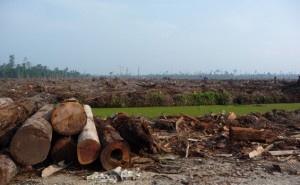 Today marks the 1st year anniversary of the latest published “forest conservation policy” (FCP) of the Sinar Mas Group’s Asia Pulp & Paper (APP). Rainforest Action Network has evaluated the progress APP and its suppliers have made towards implementing key elements of its policy as well as toward meeting the APP Performance Targets and Milestones developed by the Environmental Paper Network, a network of 120 NGOs internationally and endorsed by WWF, Greenpeace, Rainforest Action Network and Wahana Bumi Hijau among others. The Milestones set out specific performance benchmarks for implementation of the FCP as well as describe and set out performance milestones for a number of fundamental gaps in APP’s commitments.
Today marks the 1st year anniversary of the latest published “forest conservation policy” (FCP) of the Sinar Mas Group’s Asia Pulp & Paper (APP). Rainforest Action Network has evaluated the progress APP and its suppliers have made towards implementing key elements of its policy as well as toward meeting the APP Performance Targets and Milestones developed by the Environmental Paper Network, a network of 120 NGOs internationally and endorsed by WWF, Greenpeace, Rainforest Action Network and Wahana Bumi Hijau among others. The Milestones set out specific performance benchmarks for implementation of the FCP as well as describe and set out performance milestones for a number of fundamental gaps in APP’s commitments.
In summary, aside from the commendable cessation of logging activities in most of the operations of APP and its supply chain, even after one year, it is too soon to confirm that tangible conservation or social benefits have taken place on the ground as a result of APP’s policy. Most of the progress APP has made in the past year has been in collecting HCV and HCS data – most of which has yet to be shared making an assessment impossible – and in setting up teams, systems and processes such as consultants to conduct HCV assessments, protocols for standard operating procedures and the “dash board.” These are laudable and an essential component of implementing and broadening the company’s commitments, however they do not allow for evaluating whether promised reforms are having any impact. Even in the area of setting up teams and collecting data, much has yet to be done – from the need for securing stakeholder input and agreement with the interpretation and use of this data for forest management plans to the urgent need to address peatland issues, initiate FPIC processes, and scale up land and social conflict resolution.
It has been a disappointment to learn how much tropical forest, much on deep peat, was cleared by APP and suppliers in the lead up to the moratorium established by the FCP thereby erasing many potential conservation gains. By the time of the moratorium, APP’s old concessions, covering 2.6 million hectares of formerly mostly forested and often peatlands had relatively small areas of forest remaining. This reality, APP’s track record of broken promises, along with the many land and social conflicts between APP, its suppliers, and rural communities underscore the need for comprehensive and ambitious restoration, compensation, and conflict resolution to address APP’s legacy of adverse social and environmental impacts.
We welcome the news that APP has engaged the Rainforest Alliance to conduct an independent audit of its performance. It is imperative that the audit develop robust indicators for and then verifies not only APP performance in implementing the FCP, but also the EPN targets and milestones, including the gaps in the FCP including, for example, restoration/compensation for APP’s legacy of negative impacts, measuring and reducing the company’s carbon footprint and a permanent prohibition on the use of fiber from tropical natural forests. It is premature for potential customers and investors to consider establishing business ties with APP before such audit criteria have been agreed and before it has been independently verified that APP is meeting them.
Based on our evaluation we recommend
- that companies do not buy products from the APP group and avoid investing in their infrastructure expansion projects;
- that buyers and investors encourage APP to formally commit to expand its so far limited policy to cover all aspects of sustainable and responsible operations as recommended in the EPN Performance Targets and Milestones; and
- that buyers and investors wait for verification by independent NGOs and an independent auditor that the implementation of the expanded policy has resulted in real, measurable, and permanent achievements on the ground